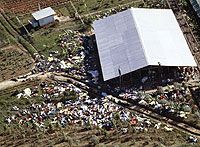Cult Life (and Death)
There is no single description that fits the lifestyle of every destructive cult out there. But there are some common themes. Many ex-cult members depict a type of insulated, moment-to-moment existence in which repressing fear and anxiety is job one. Chanting and meditation become prime coping mechanisms in this regard. Cut off from family, old friends and the outside world, their old life becomes like a dream. In their new life, psychological growth just stops -- cult members are caught in a static life that depends on not thinking, not questioning, not wondering, not remembering. Children raised in a destructive cult are stunted early. They do not usually attend school, and the cult may or may not provide its children with an education.
Cults need food, shelter and clothing like everyone else, and unless they have a wealthy benefactor or they're truly isolated, living in a jungle and growing their own food, that means they need money. Some cults make money to sustain themselves by legitimate means. The Heaven's Gate cult in San Diego, Calif., had been running a successful Web design business before they committed mass suicide in 1997. Some cults commit crimes like fraud and tax evasion to help support themselves. They may use deceptive fundraising techniques or require that new recruits make significant financial contributions to support the rest of the cult.
Advertisement
Above all else, life in a totalist cult is typically characterized by tight control. There is very little freedom in daily life: The leader prescribes what a member can and cannot do for every minute of the day. This includes what food he can eat, what books he can read, whom he can talk to, what he can wear, where he can go and how long he can sleep. The leader makes decisions, and the followers do as they're told.
For some people, living this way is a relief -- life is simple. There are no unanswered questions, no uncertainty, no worrying about the future or managing conflicting desires. Some people's lives on the outside were so bad that the cult is in reality a safe, happy place. But in a lot of cases, this type of lifestyle causes intense psychological distress. Many people experience a persistent fear of angering the leader or losing group approval. They must constantly avoid the tension between their cult world and their former life and stifle any doubts or longings that arise. In some cases, there is also the possibility of physical harm. Punishments for disobedience might be physical, and cult members are typically cut off from hospitals and regular medical care. Some studies show that children in destructive cults are more likely to be abused or neglected than in the general population.
This level of stress can lead to chronic anxiety, physical illness or even a complete mental breakdown in which a cult member may become unable to function in daily life. It's the people who experience cult life as stressful who are most likely to leave voluntarily. In the next section, we'll find out what options people have when it comes to getting out of a destructive cult.
